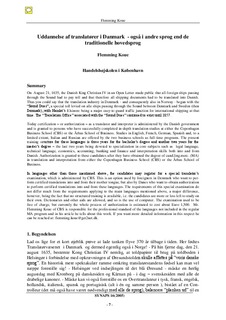| dc.description.abstract | On August 21, 1635, the Danish King Christian IV in an Open Letter made public that all foreign ships passing
through the Sound had to pay toll and that therefore all shipping documents had to be translated into Danish.
Thus you could say that the translation industry in Denmark - and consequently also in Norway - began with the
“Sound Dues”, a special toll levied on alle ships passing through the Sound between Denmark and Sweden (then
Denmark), with Hamlet’s Elsinore being a major easy-to-guard traffic junction for international shipping at that
time. The “Translation Office” associated with the “Sound Dues” continued to exist until 1857.
Today certification – or authorization – as a translator and interpreter is administered by the Danish government
and is granted to persons who have successfully completed in-depth translation studies at either the Copenhagen
Business School (CBS) or the Århus School of Business. Studies in English, French, German, Spanish and, to a
limited extent, Italian and Russian are offered by the two business schools as full-time programs. The present
training structure for these languages is three years for the bachelor’s degree and another two years for the
master’s degree – the last two years being devoted to specialization in core subjects such as legal language,
technical language, economics, accounting, banking and finance and interpretation skills both into and from
Danish. Authorization is granted to these candidates after they have obtained the degree of cand.ling.merc. (MA)
in translation and interpretation from either the Copenhagen Business School (CBS) or the Århus School of
Business.
In languages other than those mentioned above, the candidates may register for a special translator’s
examination, which is administered by CBS. This is an option used by foreigners in Denmark who want to perform
certified translations into and from their mother tongue, but also by Danes who want to obtain authorization
to perform certified translations into and from these languages. The requirements of this special examination do
not differ much from the requirements applying to the main languages mentioned above, a major difference,
however, being the fact that no structured training is available, i.e. the candidates are more or less left to study on
their own. Dictionaries and other aids are allowed, and so is the use of computer. The examination used to be
free of charge, but currently the whole process of authorization is estimated to cost about Euro 1,500. Mr.
Flemming Koue of CBS is responsible for the professional standard of the languages not included in the regular
MA program and in his article he tells about this work. If you want more detailed information in this respect he
can be reached at: flemming.koue@get2net.dk. | nb_NO |
